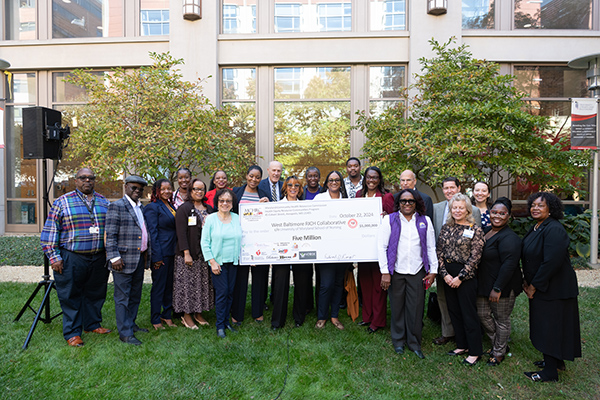From Heart Health to Mental Health: West Baltimore Residents Find Hope Through RICH 2.0 Initiative
November 22, 2024 Emily Bleiweis
RICH 2.0 brings more than a dozen organizations together to reduce cardiovascular health disparities, improve health outcomes, improve access to primary care, and reduce health care costs.
Nearly 1.5 million Marylanders suffer from hypertension or high blood pressure, including West Baltimore resident Cynthia Ward. Over the past three years, because of the University of Maryland School of Nursing (UMSON), Ward has been able stay on top of her health and get a handle on her blood pressure.
“My blood pressure is now being monitored better today than before,” Ward said Oct. 22 at a news conference promoting the school’s work in the West Baltimore community.
UMSON has worked with community, faith-based, academic, and health care partner organizations in Baltimore City to reduce social isolation and inequities in cardiovascular health through its West Baltimore RICH Collaborative, an initiative supported by a $2.4 million Pathways for Health Equity Grant from the Maryland Community Health Resources Commission (MCHRC) awarded two years ago.
Now, thanks to a new five-year, $5 million Health Equities Resource Communities (HERC) grant from the MCHRC, UMSON will build on that success through the West Baltimore Reducing Inequities in Cardiovascular and Mental Health Collaborative — Stronger Together (RICH 2.0) initiative.
“We’re just so thrilled to have all of you join us today as we celebrate the kickoff of the West Baltimore RICH Collaborative 2.0,” Yolanda Ogbolu, PhD ’11, MS ’05, BSN ’04, NNP, FNAP, FAAN, the Bill and Joanne Conway Dean of the University of Maryland School of Nursing, said at the news conference. “This is an initiative that is dedicated to reducing health disparities in cardiovascular health and mental health.
“Heart disease stands as the No. 1 killer in Baltimore, with high blood pressure being a significant risk factor and contributor of heart disease,” continued Ogbolu, who serves as principal investigator on the grant. “Despite these alarming statistics, we know that many of our residents in West Baltimore have high blood pressure, and many of them don’t know that they have high blood pressure. It is hiding in plain sight.”
Ward first connected with the original RICH Collaborative when the program came to her church during Heart Health Month.
“After enrolling, I received a BP cuff to take home, and the community outreach team called me to check on me often and gave me advice on how to help my blood pressure. I am still checking my blood pressure every day, and I am thankful for the help that I got from the RICH program,” Ward said.